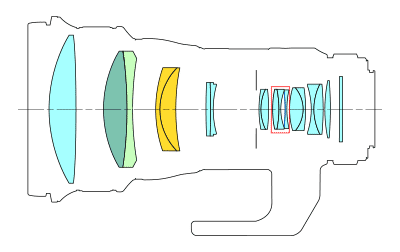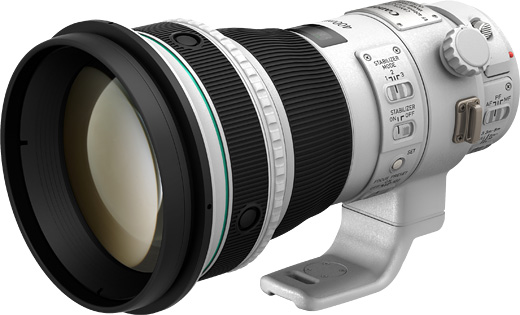- Specifications
- Block diagram
| Marketed | November 2014 |
| Original Price | 899,000 yen |
| Lens Construction (group) | 12 |
| Lens Construction (element) | 18 |
| No. of Diaphragm Blades | 9 (circular aperture) |
| Minimum Aperture | 32 |
| Closest Focusing Distance (m) | 3.3 |
| Maximum Magnification (x) | 0.13 |
| Filter Diameter (mm) | 52 |
| Maximum Diameter x Length (mm) | 128 x 232.7 |
| Weight (g) | 2,100 |
Combining chromatic aberration-correction capabilities surpassing those of fluorite lenses with aspherical-optical characteristics, Canon’s DO lens effectively suppresses the chromatic and other optical aberrations that frequently occur in telephoto lenses while contributing to the realization of a lens that is compact and light in weight.
The new EF400mm f/4 DO IS II USM incorporates ground aspherical and UD (Ultra-low Dispersion) lens elements that enable it to achieve a level of imaging performance that exceeds Canon’s previous-generation EF400mm f/4 DO IS USM, which was released in December 2001. The new model’s dual-layer DO lens reduces the occurrence of ring-shaped flaring* caused by bright light sources to approximately one-fourth the level of the earlier model. Furthermore, because the DO lens’s placement is in a position where it is not subject to exposure from light sources located outside of the image frame, the new super-telephoto lens also reduces the occurrence of backlight flaring.
* Flaring, which can result in visible artifacts or a haze across the image, is caused by the reflective scattering of light inside of the camera or its lens.

Aspherical lens UD lens DO lenses IS unit


